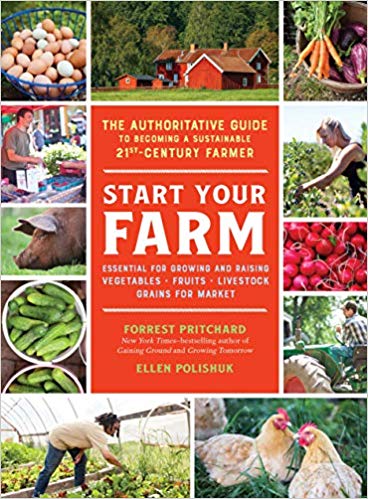272. Start Your Farm for the 21st Century Sustainable Farmer | Plant To Profit | Ellen Polishuk | Washington DC
- Author
- Jackie Marie Beyer
- Published
- Mon 24 Jun 2019
- Episode Link
- https://organicgardenerpodcast.com/272-ellen-polishuk-plant-to-profit
I am delighted to introduce my amazing guest from Plant to Profit Farm Consulting Ellen Polishuk is here to share her amazing knowledge and story as well as her new book available on amazon or her website!

Start Your Farm: The Authoritative Guide to Becoming a Sustainable 21st Century Farmer
Listen to your first audio book for free by clicking on our audible affiliate link
Tell us a little about yourself you were telling me today in Washington DC you had snow today.
Yup! as you said, just the end of January having a little bit of snow
raised in the DC Suburbs
55 been here a long time
whole career has been in agriculture
vegetable gardener
part of a farm called Potomac Vegetable Farms
25 year career there growing and selling organically grown
- vegetables
- herbs
- cut flowers
Tell me about your first gardening experience?
It’s good story everybody has to start somewhere
easiest way to describe it I think I was just born loving plants, they were sort of my sort of pets
as a little child I would collect indoor plants in my room. I got a community garden plot when I was like 8
goes back quite a long time even though I grew up in a cul de sac, the most ideal suburban childhood but somehow
agriculture grabbed me
ended up getting a degree in horticulture in college
not growing up on a a farm.
Do you want to tell listeners what sustainable agriculture maybe means to you did you learn that in horticulture school?
As a young person when I first
15-16-17 years old, luckily I worked on farms, that were quote unquote, “organically”
started getting Organic Gardening magazine like everyone else,
keep up and see what other people were doing
sustainable ag
organic more specific and legally defined now
- bigger umbrella
- terminology
- organic
- biodynamic
- some conservation practices
- irregular
- no-till farmer might take part in
- fairly broad term
- specific
- legally
Do you want to tell listeners about your book?
so, the book is written
Forrest Pritchard
grass-based livestock grower
sells in the larger DC market area
our idea
how to grow things
how to grow animals
vegetables
technical aspects of farming
what
bugs are
What we felt was missing was a book that helped described the foundational thinking, that goes with the thinking involved with a farm business
Especially for people who are thinking about moving into a farming business
income generating
what things they might want to think about
personal temperaments
resources
help
think about the business and financial aspects
manage your energy and not burn out
how not to kill relationships when your pressing hard
That area of the business mind is probably the most striking thing
Like I said, I’ve been pouring through JM Fortier’s book. Trying to figure it all out and then he talks about 2 acres which is a lot more then our 1/3 acre. IDK why at this time in my life I’m obsessed with business podcasts which is so opposite when I was in college and you probably couldn’t even get me to go into the business building. But that’s part of my personality too when you talk about temperament. So what else do you see missing?
The biggest thing is the business mind missing in folks that have an impulse to be a grower
not the same thing
at all
need to have both of those combined
in order to run a business to pay the bills to
getting friendly with numbers
can you get friendly
sustainable ag
bring together this ecological balance and all the beauties most of us growers are attracted to
- being outside
- touching the sun
- watching the plants grow
- nurturing impulse
combine that ecological care
economic stability
having a reasonable head for numbers
how much is it costing us to grow things?
what does my price need to be so I can stay in business
We talk a lot about business mindset
- roi
- how to handle your money
- pretty specific aspects
that’s the main thing
some conversation in there
thinking about your temperament from other angles:
like whether or not you’re a perfectionists?
Perfectionists are not going to find themselves particularly acceptable if you are super detailed oriented, there are not many tasks where you will be recompensed in the market
88% perfect is pretty good
I’m gonna go with it
ability
temperament without withstand things never being done
constant work in process
never finished with anything
always
- growing
- learning
- more projects
- more weather
seasons
constant growing process
maybe difficult going to bed each night knowing there are lots of things that didn’t
I think this is so fitting, I look at this from a teaching perspective. There’s so many things about my personality that don’t fit a teacher like, repetition, having to do the same schedule exactly the same way every day at the same time. That’s a part of my temperament. I’m a very visual type or person and a visionary, and I’m always looking into the future and the pace of education changes at a snails pace. And then I’m not a perfectionist, I could never get an A no matter how much I studied but I usually got B+s which I thought was pretty good.
My big question is last summer we found a business that said they would take everything we would grow but I started looking at my kale etc and was thinking other people might not like my kale with little insect holes in it that don’t bother me.
we don’t specifically make any kind of quality standard
I’m happy to parse that out with you now.
And maybe down the line we’re gonna figure that out.
Let’s just say that probably at this moment in time there’s the most capacity for regular person or consumer to handle imperfection
movement and talked about on TV, written in the paper
less then perfect vegetables
more robust in Europe but coming into the US
more organized recognition
cosmetic standards usually has to do with this
pepper has this funny shape
doesn’t mean is it going to rot but more of a cosmetic standard
shape and color
doesn’t fit in the box with the other ones
positive awareness
- lets loosen that up
- let’s not throw those things away
- make sure somebody gets to eat them
good news aspects
When it comes to bugs I think there is 0 tolerance
people don’t like bugs at all
it freaks them out
there is no respite and no place to hide
exchange a product that has bugs in it.
I know. It makes me laugh I remember when mike would enter the fair they would want everything to be the same size. Like 5 potatoes or 4 tomatoes on a vine all the same size.
I think that’s an interesting point that your making, its a good point that
there is a difference between feeding yourselves and your standards are going to be lower then what’s ok in the market place
in the market place there’s a big difference
At the farmer’s market you can get away with lots of imperfection, people sort of expect it
They’re standing there and they know what their weather is like
what their garden is
chard missing
get into the wholesale setting
sell to someone who’s going to resell
It’s interesting when we went to Young’s Farm, we were looking at the peach trees and he was saying that the peaches just weren’t ever good enough to sell, but they could sell peach pies. Like 5000 of them!
don’t have a lot of experience in the restaurant selling business
determine where ever piece was going to go
would send the worst looking stuff to a restaurant
gonna wash it and cutting it up and cook
perfect place
restaurants to taken up that mantle
thats our role to take
I’d like to spend some time talking about
What resources do you have to bear
When you talk about a farm organism?
Things cost money
building up a set of tools
infrastructure
things cost money
you need to have either time or money or both
what I find in my consulting business and teaching business
come across folks who have neither one
in a sense like this
someone writes to me
I’m on this family land
I got it for free
- I have no other job
- have to get money off this piece
They send me this soil test
soil is broken and it takes time for soil to heal
for free
money
not ready to create your amazing living right off the bat
You can heal and fix things
if you have time
3-5 years you can bring that soil alive doing good practices
or if you have a huge budget
bring 50 tons of compost
JM Fortier
liquid fertility
foliar sprays
buy microbial inoculants
I used to work for a printer he had a triangle on his wall:

I thought you were going to talk about tools, as far as labor how long it takes mike to weed his minifarm with his cultivator hoe. But I feel like you just dropped a ton of golden seeds about things I have never thought of.
I always tell people, go ahead and quit your day job, but get a night job. We delivered the paper that was helped me get my podcast off the ground. People always say to me you’ve been doing this for 4 years why aren’t you making money but it takes a long time to get an online business off the ground.I feel like I grow in leaps and bounds.
on target with what I am trying to talk about
closely related
said a different way
read books like JM Fortier’s book and say I’m gonna do that but then they don’t buy the 50 tons of compost.
think they are going to plant intensively and all these plants and their soil resource isn’t ready and they don’t get very good crops
be careful about following the advice or a book or something you have read
if you don’t understand how that person is building a whole system
some part is successful
JM Fortier style
you have to do do 50 tons of compost over and over and over again
that’s his system. If you want the results of his system you have to put it to work.
Not to say anything negative his book is amazing very inspiring.
That’s like I was looking for a job online customer service and I was reading people’s terms and conditions for refunds, and it was like can you prove you did this, this, and this.
I’m glad you brought that up, because that’s another thing
somehow people think that faming doesn’t require practice and it isn’t a profession especially people who aren’t even gardeners think

